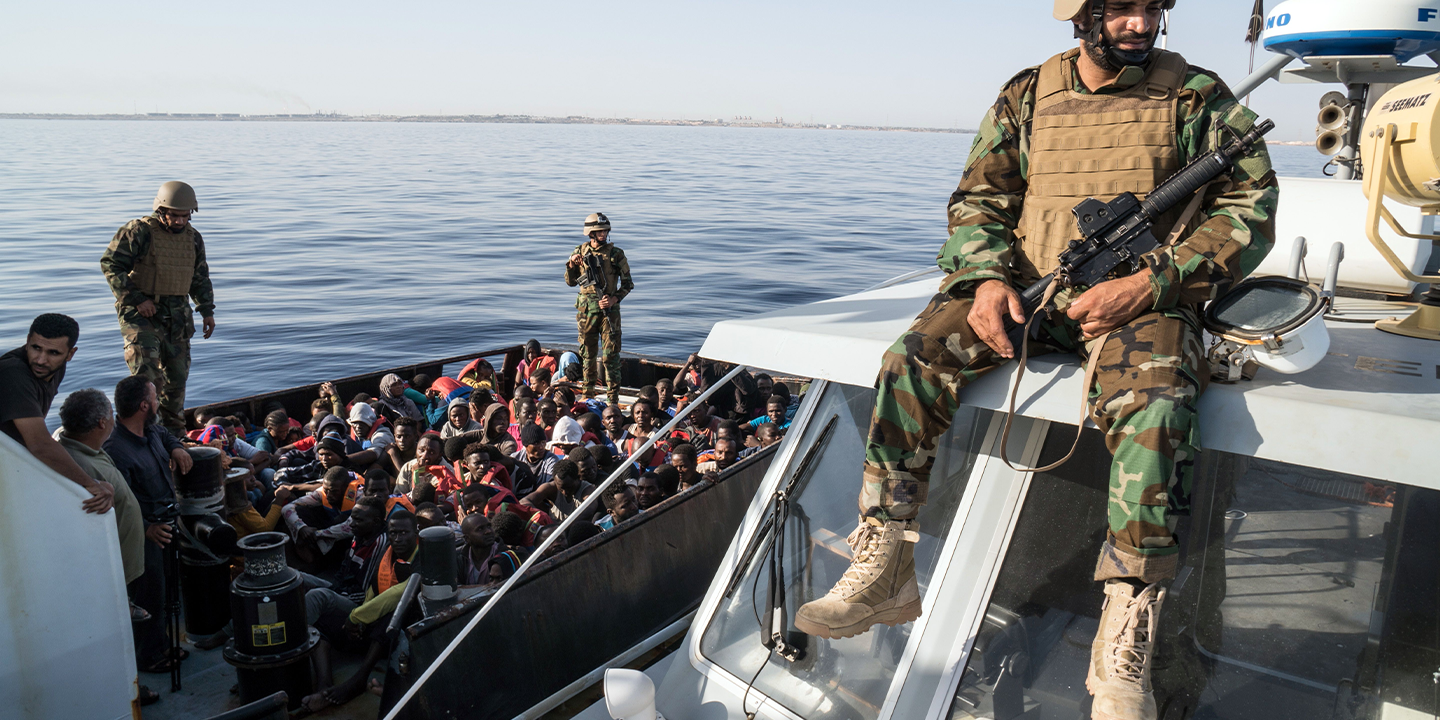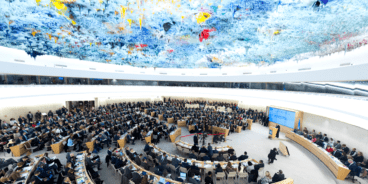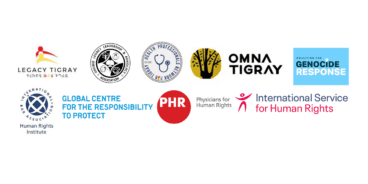

Atrocity Alert No. 340: Libya, North Korea and Ethiopia
Atrocity Alert is a weekly publication by the Global Centre for the Responsibility to Protect highlighting situations where populations are at risk of, or are enduring, mass atrocity crimes.
“WIDE ARRAY” OF WAR CRIMES AND CRIMES AGAINST HUMANITY PERPETRATED IN LIBYA
On 27 March the UN Human Rights Council-mandated Fact-Finding Mission (FFM) on Libya presented its final report, concluding that there are reasonable grounds to believe that a “wide array” of war crimes and crimes against humanity have been perpetrated by state security forces and armed militia groups since 2016. The FFM documented the widespread practice of arbitrary detention, murder, torture, rape, enslavement and enforced disappearance. To date, no individual or armed group has been held accountable.
The report highlighted how migrants across Libya have been particularly targeted by ongoing crimes against humanity. The FFM’s investigation found reasonable grounds to believe that the crime against humanity of sexual slavery has been committed against migrants, and that there is “overwhelming evidence” that migrants have been systematically tortured in detention centers and “secret prisons.” State authorities and affiliated entities were repeatedly found to be involved in violations and abuses in detention centers.
The report noted that trafficking, enslavement, forced labor, imprisonment, extortion and the smuggling of vulnerable migrants generated significant revenue for individuals, groups and state institutions and incentivized the continuation of widespread and systematic attacks on migrants, including in detention centers, at sea and along trafficking routes and hubs. Despite previous warnings from the FFM and human rights groups, Libyan authorities have continued their efforts to intercept migrants while crossing the Mediterranean Sea to Europe. This latest report concluded that the European Union (EU) and its member states have directly or indirectly supported – through monetary and technical support and equipment – the Libyan authorities’ interception and detention of migrants.
The FFM’s findings were presented as the human rights situation in the country deteriorates. The sweeping restrictions imposed against civil society, including accessing detention facilities and vulnerable communities, remain in place. According to the FFM, Libyan authorities, particularly the security sector, are restricting the rights to assembly, association, expression and belief in a broad effort to repress dissent. Attacks against human rights defenders, women’s rights activists, journalists and civil society organizations have created a climate of fear and self-censorship to avoid reprisals, arrest or extortion.
Mohamed Auajjar, Chair of the FFM, said, “We call on Libyan authorities to develop a human rights plan of action and a comprehensive, victim-centred roadmap on transitional justice without delay, and hold all those responsible for human rights violations accountable.” Libya’s leaders must end ongoing abuses against migrants. The EU and its member states should cease all direct and indirect support to Libyan actors involved in crimes against humanity and grave human rights violations against migrants. With sustained international support, Libyan authorities should also acknowledge past atrocities and provide credible justice for victims and survivors. The HRC should ensure monitoring on the implementation of the FFM’s recommendations and meaningful follow up on the human rights situation in Libya.
UN MECHANISMS CALL ATTENTION TO PERVASIVE VIOLENCE AGAINST WOMEN IN NORTH KOREA
On 20 March the UN Special Rapporteur on the situation of human rights in the Democratic People’s Republic of Korea (DPRK), Elizabeth Salmón, presented her report to the Human Rights Council (HRC), detailing widespread discrimination and pervasive violence against women and girls committed with impunity.
Special Rapporteur Salmón highlighted that women in detention centers are particularly vulnerable to violations and abuses. According to the report, women are detained in inhumane conditions, deprived of food and subjected to torture, forced labor and gender-based violence, including sexual violence perpetrated by state officials. Male officers have allegedly sexually exploited detained women in exchange for reducing their penalty or improving their treatment during imprisonment. Former female detainees have also reported that pregnant inmates underwent forced abortions and hard labor.
According to the report, women also face persistent discrimination and deep-seated gender inequality. Women have been harmed by widespread gender stereotypes, as violence against women has not been treated as a serious crime and the stigma associated with sexual violence and harassment prevents redress for victims. There is also a lack of adequate, institutional mechanisms to protect and support women, particularly those who are victims of gender-based violence.
On 27 March the Office of the UN High Commissioner for Human Rights (OHCHR) published a report examining enforced disappearances and abductions from 1950 to 2016, including arbitrary detentions inside DPRK. The fate and whereabouts of the victims remain unknown and as a result, victims and their families have suffered from sustained trauma and suffering. According to the report, the violations have had economic consequences for families in a context where most disappeared persons are men, stating that, “women have had to shoulder the entire burden of family life themselves, at a time when they were under surveillance and treated with great suspicion.”
Systematic abductions and enforced disappearances, as well as violations against women and girls, have been well-documented by UN human rights bodies, particularly the HRC-mandated Commission of Inquiry (CoI). In 2014 the CoI established responsibility at the highest level of government for ongoing crimes against humanity, as well as other systematic and widespread human rights violations, including extermination, gender persecution, rape and other forms of sexual violence and enforced disappearance. According to a January 2023 report by the UN High Commissioner, OHCHR continues to gather information that is consistent with the CoI’s findings.
The government of DPRK must reform its judiciary, law enforcement and corrections systems in accordance with international human rights norms and standards. It is imperative that DPRK authorities explore all opportunities for technical cooperation and engagement with OHCHR, as well as permit Special Rapporteur Salmón access to the country and information on the human rights situation. During the HRC’s ongoing 52nd session, member states should renew the mandate of the Special Rapporteur for a period of three years.
TRANSITIONAL JUSTICE CRUCIAL TO ADDRESS ATROCITY CRIMES IN ETHIOPIA
On 20 March United States Secretary of State, Antony Blinken, announced that the United States (US) formally determined that armed forces on all sides of the two-year conflict in northern Ethiopia have committed war crimes, including members of the Ethiopian National Defense Forces (ENDF), Eritrean Defense Forces (EDF), Tigray People’s Liberation Front (TPLF) forces and Amhara forces. The US further accused the ENDF and EDF of crimes against humanity, and Amhara forces of crimes against humanity and ethnic cleansing.
Prior to the US determination, several UN mechanisms, including the Human Rights Council-mandated International Commission of Human Rights Experts on Ethiopia (ICHREE), and international human rights groups found reasonable grounds to believe that crimes against humanity and war crimes were perpetrated in northern Ethiopia. Numerous reports and investigations documented indiscriminate bombings, ethnic-based killings, sexual violence, forced displacement, use of child soldiers, destruction of cultural heritage and the systematic destruction of food, water and healthcare since the start of the conflict in Tigray in November 2020. The Chair of the ICHREE, Mohamed Othman, noted that despite the Cessation of Hostilities Agreement and subsequent relative improved security situation, “we must not forget the gravity and scale of the violations committed in Ethiopia since November 2020.”
On 2 November 2022 the Ethiopian federal government and the TPLF agreed to the Cessation of Hostilities Agreement, which went into effect on the same day as the second anniversary of the conflict. While the agreement has resulted in a significant decrease in fighting and allowed increased aid delivery to Tigray, some challenges remain. In a significant step towards establishing an interim regional government in accordance with the peace agreement, on 22 March the Ethiopian Parliament removed the TPLF from a list of “terrorist” organizations – a prerequisite for the TPLF’s participation in the interim government.
Despite last month’s announcement by the government of Ethiopia on its intention to lobby for the abrupt termination of the mandate of the ICHREE, the work of the Commission to investigate and report on alleged violations of international human rights, humanitarian and refugee law and to provide advice regarding transitional justice remains crucial, particularly for victims and survivors, the deterrence of future crimes and the sustainability of the peace process. All parties to the conflict should cooperate with the ICHREE and allow the Commission to carry out its mandate, as well as commit to a credible transitional justice process. As stated by Secretary Blinken, “acknowledgement, accountability, and reconciliation are key to breaking the cycle of ethnic and political violence that has gripped Ethiopia and prevented it from reaching its unlimited potential for too long.”
Related Content


